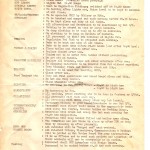PSA Paper – 15May 2013
Intro
 Has the Protestant working class lost out in the Peace Process? This is a question that many people have been asking since April 1998. The issue has, however, come into sharp relief in the past ten years or so and over the past five years it has been magnified. Have we reached the crisis point? Or did we reach it in 2012, 2011, 2005 or 2000? Arguably we have to go back to before the ‘peace process’ even existed. If we want an accurate picture, we have to revisit the start of the Troubles: arguably that is when the Protestant working class truly lost out.
Has the Protestant working class lost out in the Peace Process? This is a question that many people have been asking since April 1998. The issue has, however, come into sharp relief in the past ten years or so and over the past five years it has been magnified. Have we reached the crisis point? Or did we reach it in 2012, 2011, 2005 or 2000? Arguably we have to go back to before the ‘peace process’ even existed. If we want an accurate picture, we have to revisit the start of the Troubles: arguably that is when the Protestant working class truly lost out.
I: Tartan Letter
I have recently been carrying out research into the loyalist ‘Tartan’ gangs of the early 1970s. During my research I came across an ‘open letter’ in the Belfast Telegraph by the political commentator Barry White. The letter, from May 1972 was written in response to a recent upsurge in Tartan violence. Here are a few excerpts –
I don’t suppose you give a damn, but I think I know why you did what you did in East Belfast last week-end. You are young, it is spring, there is nowhere to go, nothing better to do, so you go looking for trouble. I’ve done it myself.
It’s not the pleasantest place to live, East Belfast. The houses are small, overdue for demolition, and the only playing fields are the streets. Youth clubs are fine, but they’re dull when there’s some excitement to be had outside.
It’s the people who make the place. They’re tough on the outside, but couldn’t be kinder to their own sort. They’re proud to come from the wee streets, and most of all they’re proud to be Protestant.
 Since those civil rights people started marching you’ve seen your little world crumbling. First they got their way by marching and rioting, and then – when the Protestants hit back – by getting their houses burned down. They couldn’t lose, and since the IRA took over, they’ve done even better. Nothing even slowed them down – certainly not internment – and by murdering, maiming and destroying they have succeeded in toppling your Protestant Parliament.
Since those civil rights people started marching you’ve seen your little world crumbling. First they got their way by marching and rioting, and then – when the Protestants hit back – by getting their houses burned down. They couldn’t lose, and since the IRA took over, they’ve done even better. Nothing even slowed them down – certainly not internment – and by murdering, maiming and destroying they have succeeded in toppling your Protestant Parliament.
It was enough to make any Protestant blood boil, and it isn’t really surprising that you hit the top last week-end. Those two bombs in Castlereagh Street softened you up, and those pictures of the IRA in the Bogside and the internees getting out were the last straw, even if you don’t count the Vanguard rally in Templemore Avenue.
Substitute ‘Tartans’ in that letter for the phrase ‘some flag protestors’; or ‘IRA’ for Sinn Fein; or indeed ‘Vanguard’ for DUP and you have a letter describing a situation which is still familiar to some working class Protestants 41 years on. Indeed it is a situation that was played out on a few occasions in east Belfast during the weeks that followed the initial vote to limit the number of days on which the Union flag would fly over Belfast City Hall.
II: The Early 1970s & Community Fragmentation: A very British concept?
If things are so similar in that respect, perhaps it is worth revisiting that era briefly to try and figure out the possible roots of some of the problems that the Protestant working class in Belfast are currently enduring.
McAuley and McCormack have rescinded the notion that the Protestant working class constituted a ‘labour aristocracy’ in Northern Ireland and have noted that ‘By the mid-1950s…it had become clear that the traditional industrial base of shipbuilding, textiles and engineering could not guarantee a viable and prosperous economy.’
In this environment a lack of education could have proved fatal to the aspirations of the Protestant working class. For many it was precisely this fissure that made Protestant working class males prone to a social and economic disparity with their Catholic counterparts who by the late 1960s had begun to see the progression of a first generation of adults who had benefited from the Education (Northern Ireland) Act of 1947. The fact that the Troubles were on the horizon meant that any misery endured by the Protestant working class through the process of industrial decline would only be compounded by the problems which civil unrest brought.
While deindustrialisation occurred in other parts of the UK after the 1960s, and the shipyards of the Clydeside, Tyneside and Merseyside suffered, these working-class communities did not have the added pressure of political violence to contend with. The essence of understanding the Protestant working class and their sense of angst I feel is to understand them as part of a wider British working class community: an ‘East-West’ perspective is needed. The early 1970s was certainly a shock to the system for both sides of the community in Northern Ireland. Catholics suffered indiscriminately at the hands of roaming loyalist murder gangs, while both Catholics and Protestants had to endure the IRA’s reckless bombing campaigns that destroyed the commercial vitality and viability of Belfast city centre. This combination of violence and deindustrialisation affected the Protestant working class in a unique manner which is perhaps best understood by referring at least in part to Paul Willis’ 1978 work which was entitled Learning to Labour.
In Willis’ study he noted that the ‘lads’ (a group terminology used by Willis to describe his working-class research subjects) formed an ‘oppositional culture’ to education, feeling that they were pre-destined to an unskilled job in the industrial workplace. I don’t think that the perceived indifference of the Protestant working class to education prior to the Troubles is a completely satisfactory reason for the current malaise. One need only look at Orangefield, Carolan, Grosvenor and Annadale to see good schools with a strong reputation which were filled with Protestant working class children. The general consensus however is that the Protestant working class attitude to education was similar to the lads in Willis’ study. Due to the process of deindustrialisation the jobs that would have been available to Willis’ ‘lads’ and Protestant working class males in Northern Ireland from the 1970s onwards became redundant. Linda McDowell (the sociologist, not the journalist), in her 2003 study Redundant Masculinities, picked up on this phenomenon and its negative effects. She states ‘In the UK, today still a predominantly white country, male manual workers are, of course, the group currently most threatened by deindustrialisation, economic change and the growing dominance of the service sector. Rates of unemployment are consistently higher for men in old manufacturing districts…’
Speaking to a community worker in East Belfast six years ago, he was of the opinion that to be a Protestant working class male was to be at the bottom of the pile. The exclusion of young men from the so-called ‘feminised’ labour market is best summed up when the community worker in question stated that he had young Protestant men come to him and state that they wouldn’t go for a job in Tesco as a ‘replenishment officer’ as it was too ‘high-powered’ for them; above their station. Here, the language of the labour market is a stumbling block.
In the early years of the conflict, many Protestant working-class communities were decimated as people fled the threat of the Provisional IRA at interfaces and intracommunally the dreadnoughts of their local loyalist paramilitaries. The grip of civic guardians such as those involved with the Protestant churches and consequently the Boys’ Brigade and other uniformed organisations was dissipating; indeed many of these so-called community leaders fled Protestant working-class areas as the temperature rose, seemingly content to leave the emerging problems of violence and high unemployment behind. Trade unionists who would have provided reasonable voices and strong leadership qualities in Protestant neighbourhoods were overtaken or subsumed by the emergence of more militant workers groups, notably the Loyalist Association of Workers.
Of course there was another important process at work during the early 1970s and that was the redevelopment of the Shankill due to the Belfast Urban Motorway project which gave rise to the Westlink. As Ron Wiener demonstrated in his seminal work The Rape & Plunder of the Shankill the strong sense of community which had been present in the Shankill prior to the Troubles was decimated by fanciful city planning which pushed working class people further out into the suburbs and thereby breaking up solid community and family networks. The Shankill, with an ageing population, has never truly recovered from this. Divorced from the violent context what happened to the Shankill is more or less the same as what had happened to another proud working-class community in London’s East End during the late 1950s. As Phil Cohen has noted, plans to ‘‘modernize’ the pattern of East End life’ were a disaster and did not allow for ‘any effective participation by a local working-class community in the decision-making process at any stage or level of planning.’ While housing in places such as Dagenham and Greenleigh were substantially better than the slums that people had inhabited, the kinship network which had sustained community morale was destroyed. Add the violence of the early 1970s to the redevelopment of an area such as the Shankill and the population movements happening across Belfast and you can envisage a disorientated component part of British working class life struggling to adapt to a place apart.
III: Conclusion
I purposefully avoided dwelling too much on the conflict in this brief and informal paper. I wanted to demonstrate how many of the losses suffered by the Protestant working class at the start of the Troubles led to a sense of frustration owing to the disaggregating effects of social forces and political violence on their sense of Britishness. That is not to say that the Protestant working class felt or feel any less British themselves, but an opportunity was perhaps lost for the Protestant working class to keep in tune with the ongoing refashioning of contemporary British identity. While the white working class of the East End have adapted to this refashioning or withdrawn into a familiar sense of British identity by moving away, the Protestant working class in parts of Belfast are arguably still coming to terms with the breakdown of community and civic structures which occurred in the early 1970s. The Tartans who rioted in 1972 and the flag protestors who rioted in 2013 share the same core issues of unemployment and a lack of a vision for the future; problems which young people across the UK faced then and now. However with a peace process that is perceived to be designed for the benefit of republicans and a perception of being cut adrift from the rest of the British working class which once reflected their hopes, dreams and ambitions it is little wonder that the Protestant working class feel marginalised and without direction.






